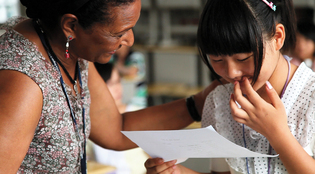 loading
loading
Light & VerityAlumni visit China, to workYale Alumni Service Corps in action.  Brian WimerYale Alumni Service Corps volunteer Elsa Stoner taught students in Xiuning, China, in July. View full image
At 8:00 one Tuesday morning last July, in the western Chinese town of Xiuning, you might have heard a verse of “Eyes-ears-shoulders-knees-and-toes” go echoing across the middle-school quad, to be joined by a harmonica’s humming Beethoven’s “Ode to Joy” from the other side. If you listened long enough, you would also have heard a chorus of “Bulldog! Bulldog! Bow wow wow! Eli Yale!” Yalies were running classes in Xiuning, via a joint project of the 110-year-old Yale-China Association and a much newer organization, the Yale Alumni Service Corps (YASC). The weeklong “service tour” boasted 184 alumni-and-family volunteers—129 adults and 55 children. They came from 7 countries and 25 US states and represented Yale classes from 1958 through 2010. This was the sixth international service trip organized by the YASC since 2008; previous tours have taken alumni to the Dominican Republic, Mexico, and Brazil. Along with an annual Day of Service, the trips are part of an all-out effort by the Association of Yale Alumni (AYA) to open up opportunities for alumni to serve and volunteer. Mark Dollhopf ’77, the AYA’s executive director, believes Yalies have a duty to make use of their privileges by helping others. Judging by their response, the alumni agree. On arriving in Shanghai, the travelers were whisked to Xiuning, where they taught in three schools of Chinese children. The week of intensive instruction boasted a full curriculum of core studies, along with tin flutes, teepees, and three or four pandas. The YASC brought literature, math, science, drama, photography, yoga, and Spanish to the schools. Music resounded in the elementary and middle schools while, across town at the high school, students were scripting and shooting a short film. At more advanced levels, a contingent of business mentors took students through the rigors of profit-loss analysis and working capital. A medical team compared surgery notes (and treatments for the common cold) with their Chinese counterparts. In concert with the Xiuning project, still another AYA service tour took place in Beijing, where alumni volunteers for the Yale Global Alumni Leadership Exchange met with officials from four Chinese universities. Their (slightly different) curriculum focused on such alumni-relations basics as how to hold a class reunion. Alumni who take part in the service tours get an education of their own, through sheer concentrated cultural immersion. Valerie Hotchkiss ’90PhD, who brought her 11-year-old son Sam, spoke for many: “We came to teach, but what we did was learn.” As parting gifts to their hosts in Xiuning, the YASC presented bowls made of wood from a gingko tree that once grew on the Yale campus. (The bowls were handcrafted by Yale biology professor Scott Strobel.) Because the tree was likely one of the first that was shipped from China to the United States, back in the 1800s, it was an apt reminder of Yale’s 110 years of active engagement in China. With the return of the wood to Xiuning, it became a symbol of continuing exchange.
The comment period has expired.
|
|